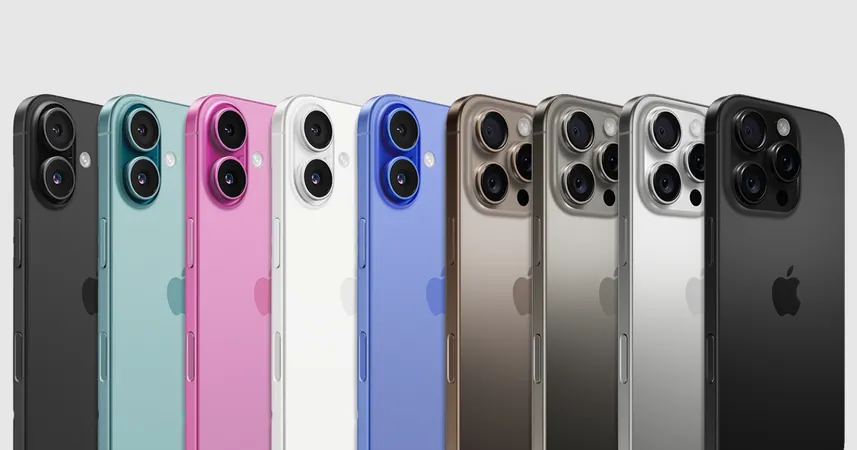
iPhone 16 5G Performance: Is It Time to Upgrade? Here’s How It Stacks Up Against the Competition!
2024-11-17
Author: Wei Ling
The highly anticipated iPhone 16 series made its debut on September 20, 2024, just in time for consumers assessing their upgrade options ahead of Black Friday. As buyers weigh the decision, a pressing question emerges: Is the jump to the iPhone 16 worth the investment? We've delved into the first weeks of its performance across various countries, especially focusing on critical aspects like 5G speed and latency, comparing it not only to previous iPhone generations but also to Samsung's latest Galaxy S24 flagship.
Using Speedtest® data gathered from 11 countries between September 20 and October 20, we examined how the new iPhone 16, available in four variants (iPhone 16, 16 Plus, 16 Pro, and 16 Pro Max), performed in handling 5G connectivity against its predecessors—the iPhone 14 and 15—not to mention Samsung's Galaxy S24 lineup.
A crucial insight is that the performance of mobile devices can greatly differ in various regions due to multiple factors like network capability, investment in 5G infrastructure, and spectrum allocation.
Key Findings:
1. **Speed Superiority**: The iPhone 16 family showed a commendable lead in median 5G download speeds in five of the countries examined. Observations indicated that the iPhone 16 outperformed the iPhone 14 in speed testing in seven out of eleven countries.
2. **Latency Leader**: The Samsung Galaxy S24 recorded the best median 5G multi-server latency in eight markets, while the iPhone 16 managed to lead in a single one.
3. **Upload Speed Champion**: The Galaxy S24 family also excelled in median 5G upload speeds, surpassing the iPhone 14 and 15 models quite noticeably.
Upgraded Connectivity:
The iPhone 16 series showcases significant advancements with its new hardware. The base and Plus models utilize the Apple A18 system on a chip (SoC), while the Pro versions are powered by the A18 Pro variant. All models are equipped with the Snapdragon X75 5G modem. This compares to the previous generation’s A16 Bionic and A17 Pro chipsets, which were paired with the earlier Snapdragon X70 and X65 modems respectively.
Geographic Performance Breakdown:
**Asia Pacific**: - **India**: The iPhone 16 recorded a median 5G download speed of 261.57 Mbps with impressive latency, while its closest competitor, the Galaxy S24, trailed slightly. - **Taiwan**: The iPhone 16 set the benchmark with a remarkable download speed of 342.37 Mbps, leading a strong showing from all models.
**Europe**: - **France**: With a speed of 279.29 Mbps, the iPhone 16 outpaced older iPhones and edged ahead of the Galaxy S24, making it a compelling option for speed-seekers.
**Latin America**: - **Brazil**: Despite high performance across all devices, the marginal speed differences mean buyers should focus on features rather than just speed. - **Colombia**: The Galaxy S24 took a clear lead in both download and upload speeds, demonstrating the competitive edge of Samsung's offerings.
**North America**: - **United States**: The iPhone 16 achieved a median download speed of 324.23 Mbps, decisively outperforming both the Galaxy S24 and previous iPhone models, making it an attractive upgrade.
Should You Upgrade?
For many consumers, upgrading to the iPhone 16 makes a solid case due to its enhanced performance, especially in regions where higher speeds can drastically improve user experience. Although the differences might seem minor in some regions, locations with faster networks could fully exploit the capabilities of the iPhone 16.
In conclusion, while the iPhone 16 exhibits remarkable advancements over its predecessors, particularly in speed and latency, the decision to upgrade should factor in personal preferences, budget, and feature sets. For enthusiasts eager for the latest technology, the iPhone 16's 5G performance is highly encouraging. Stay tuned as we continue to monitor and report on device performances as new models hit the market! 🔥📱


 Brasil (PT)
Brasil (PT)
 Canada (EN)
Canada (EN)
 Chile (ES)
Chile (ES)
 España (ES)
España (ES)
 France (FR)
France (FR)
 Hong Kong (EN)
Hong Kong (EN)
 Italia (IT)
Italia (IT)
 日本 (JA)
日本 (JA)
 Magyarország (HU)
Magyarország (HU)
 Norge (NO)
Norge (NO)
 Polska (PL)
Polska (PL)
 Schweiz (DE)
Schweiz (DE)
 Singapore (EN)
Singapore (EN)
 Sverige (SV)
Sverige (SV)
 Suomi (FI)
Suomi (FI)
 Türkiye (TR)
Türkiye (TR)